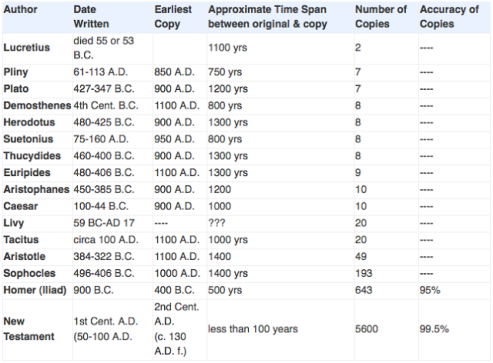In my previous blog post, a reader said that he didn’t believe the gospels to be “accurate, historical documents.” When I challenged him on his claim, he gave a few reasons that I will show have absolutely no validity at all. This person has sadly been misinformed about that which he speaks regarding the gospels. I’ll address his charges point by point.
- He says the “writers of the gospel [sic] were not eyewitnesses. They didn’t even live at the same time.” This is simply false information. Matthew and John were both disciples of Jesus and knew him personally. Mark was not a disciple because of his age, but he worked closely with Peter (a disciple of Jesus) as his closest adviser for many years. Luke was a friend of Paul, a man who knew the apostles and encountered Jesus himself. Luke interviewed eyewitnesses in order to write his account. So again, this charge is just absolutely false. Two of the gospel writers were eyewitnesses and the other two knew the eyewitnesses.[1]
- He says, “the events have not been discussed in any other source” except Josephus, “but not that he did some really great stuff, etc. [sic].” Again this is false information. There are several non-Christian places where events involving Jesus have been recorded. These include works by Jews, Romans, and Greeks. The list is as follows:[2]
– Josephus, (Jewish)
– Several portions of the Talmud
– Lucian of Samosata (Greek)
– Mara bar Serapion (Greek)
– Thallus (Roman)
– Tacitus (Roman)
– Pliny (Roman)
– Suetonius (Roman)
– Phlegon
– Celcus
- He alleges supposed contradictions but never elaborates on the point. It should be pointed out that the alleged contradictions that many skeptics refer to simply reflect natural variations that occur when a story is told by two different humans.[3] The differences in the way the accounts are recorded do not in any way change the intended meaning of the event. Nearly all supposed contradictions can be attributed to minor transmission error or that the Bible is based on eyewitness accounts that complement one another, not contradict each other. Indeed if the Gospels were not the Gospels, they would be hailed the world over as the world’s most reliable text of the ancient world.[4] The works of the New Testament are incredibly more reliable than any other ancient work in the history of the world as evidenced by the following chart:
This chart was found at http://carm.org/manuscript-evidence
After looking at this factual chart, if one dismisses the bible as historically reliable, then one must dismiss all writings of ancient history because they do not come close to the reliability of the bible. So as we can see, the reader’s charge about contradictions is absolutely false.
- He claims the authors of the Gospels were “primitive shepherders [sic].” This could not be further from the truth. I would love to know the reader’s source on this!
There are many, many, many other truths that prove the New Testament and the Gospels to be accurate, reliable, and historical. The archaeological discoveries made thus far in human history have confirmed everything the bible has said about such things. The New Testament shows that Jesus fulfilled all the messianic prophecies of the Old Testament such that if left to chance, the chances of a man fulfilling those prophecies by accident would be as great as the universe exploding into being out of nothing! So I hope and pray that the individual making these erroneous charges will lift the veil of his presuppositions from his mind and see the truth of the bible.
[1] Markos, L. (2010). Apologetics for the 21st Century. Wheaton, Illinois: Crossway, p. 153.
[2] Turek and Geisler (2004). I Don’t Have Enough Faith To Be An Atheist. Wheaton, Illinois: Crossway, p. 270.
[3] Groothuis, D. (2011). Christian Apologetics. Downers Grove, Illinois: InterVarsity Press, p. 453.
[4] Markos, L. (2010). Apologetics for the 21st Century. Wheaton, Illinois: Crossway, p. 151.




